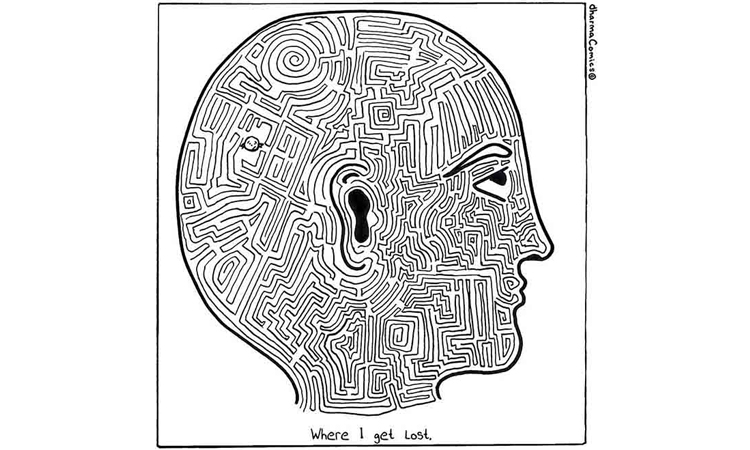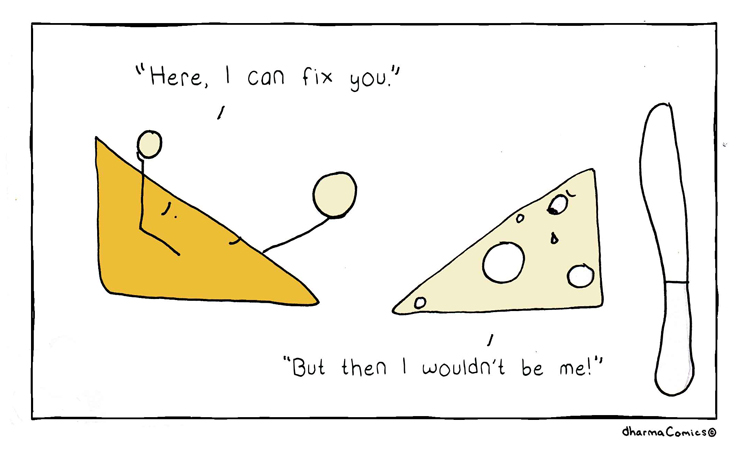“It’s human nature to get swept up in our feelings, but by focusing our attention inward we can observe our problematic thoughts and learn what triggers them.”
-Rose Caiola
Separate people from problems through naturopathic Narrative Therapy
As a child, I was obsessed with all kinds of stories. I created characters with friends and threw them into narratives. Writing stories is about selecting certain events and connecting them in time and sequence to create meaning. In naturopathic medicine I found a career in which I could bear witness to people’s stories. More recently, in narrative therapy I have found a way to heal people through helping them write their life stories.
In one such case, “R” was a patient of mine at the Yonge Street Mission. Like my other patients at the mission health clinic, R was a young male who was homeless. He had come to see me for acupuncture, to help him relax. When I asked him what brought him in to see me on this particular day, his answer surprised me in its clarity and self-reflection. “I have a lot of anger,” he said, keeping his sunglasses on in the visit.
R spoke of an unstoppable rage and violence that would appear frequently in his interactions with other people. This anger, he said, got him in trouble with the law. He was scared by it. He didn’t really want to hurt others, but this anger was escaping his control.
We chatted for a bit, and I put in some acupuncture needles to calm his mind. After the treatment, R left a little lighter and with a calmer mind. The treatment worked. I attributed this to the fact that he’d been able to get some things off his chest and relax in a safe space free of judgment.
I congratulated myself, while at the same time lamented the sad fact that R was leaving my safe space and re-entering the street, where he’d no doubt go back to floundering in a sea of crime, poverty and social injustice. I sighed and shrugged, feeling powerless.
The clinic manager, a nurse practitioner, once told me of my patients, “Of course they’re angry. These kids have a lot to be angry at.” I understood theoretically that social context mattered, but only in the sense that it posed an obstacle to proper healing. It’s hard to treat stress, diabetes, anxiety and depression when the root causes or complicating factors are joblessness, homelessness and various traumatic experiences. Much of the time I felt like I was bailing water with a teaspoon to save a sinking ship; my efforts to help were fruitless. I believe in empowering my patients, but how could I empower others if I felt powerless?

Recently, I took a Narrative Therapy intensive workshop. We learned many techniques for empowering people and healing them via the formation of new identities through storytelling. In order to do this, narrative therapy extricates the problem from the person.
By separating problems from people, we are giving our patients the freedom to respond to or resolve their problems in ways that are empowering. Michael White, one of the founders of Narrative Therapy says, “If the person is the problem, there is very little that can be done outside of taking action that is self-destructive.”
Many people who seek healthcare believe that their health problems are a failure of their bodies to be healthy. Naturopathic medicine, which aims to empower people by pointing out they can take action over their health, instead can disempower people when we unwittingly perpetuate the idea that our solutions are fixing a broken person and, even worse, that we hold the answer to that fix.
If we fail to separate our patients from their health conditions, our patients come to believe that their problems are internal to the self – that they or others are in fact, the problem. Failure to follow their doctor’s advice and heal, then becomes a failure of the self. However, when health conditions are externalized, the condition ceases to represent the truth about the patient’s identity, and options for healing suddenly show themselves.
While R got benefit from our visit, the benefit was temporary. R was still the problem, according to his own perception. He left the visit still feeling like an angry and violent person, only slightly calmer. If I had succeeded in temporarily relieving R of his problem, it was only because I had acted. At best, R was dependent on me. At worst, I had perpetuated the idea that there was something wrong with him and that he needed fixing.
 These kids have a lot to be angry at, my supervisor had said. R was angry. But why? Since I hadn’t really asked him, I can only guess. The possibilities for imagining answers, however, are plentiful.
These kids have a lot to be angry at, my supervisor had said. R was angry. But why? Since I hadn’t really asked him, I can only guess. The possibilities for imagining answers, however, are plentiful.
R and his family had recently immigrated from Palestine, a land ravaged by war, occupation and racial tension. R was homeless, living in poverty in an otherwise affluent country, Canada. I wasn’t sure of his specific relationship to poverty because I hadn’t inquired, but throughout my time at the mission I’d been exposed to other narratives that may have intertwined with R’s personal storyline. Those narratives included themes of addiction, abortion, hunger, violence, trauma, abandonment and other tragic experiences.
If his story in any way resembled those of other youth I see at the mission, it’s fair to say that R had probably experienced a fair amount of injustice in his young life; he certainly had reasons to be angry. I wonder if R’s anger wasn’t simply anger, but an act of resistance against injustice against him and others in his life: an act of protest.
“Why are you angry?” I could have asked him. Or perhaps, “What are you protesting?”
Those simple questions might have opened our conversation up to stories of empowerment, personal agency, skills and knowledge. I might have learned of the things he held precious. We might have discussed themes of family, community and cultural narratives that could have developed into beautiful storylines that were otherwise existing unnoticed.
Because our lives consist of an infinite number of events happening, moment to moment, the potential for story creation is endless. However, it is an unfortunate reality that many of us tell the same single story of our lives. Oftentimes, the dominant stories we make of our lives represent a problem we have.
In my practice I hear many problem stories: stories of anxiety, depression, infertility, diabetes, weight gain, fatigue and so on. However, within these stories there exist clues to undeveloped stories, or subordinate stories, that can alter the way we see ourselves. The subordinate stories of our lives consist of values, skills, knowledge, strength and the things that we hold dear. When we thicken these stories, we can change how we see ourselves and others. We can open ourselves up to greater possibilities, greater personal agency and a preferred future in which we embrace preferred ways of being in the world.
I never asked R why the anger scared him, but asking might have provided clues to subordinate stories about what he held precious. Why did he not want to hurt others? What things did he hope for in his own life and the lives of others? Enriching those stories might have changed the way he was currently seeing himself – an angry, violent youth with a temper problem – to a loving, caring individual who may have been protesting societal injustice. We might have talked about the times he’d felt anger but not acted violently – he’d briefly mentioned turning to soccer instead – or what his dreams were for the future.
I might have asked about the values he’d been taught, such as why he thought violence was wrong. Who taught him that? What would that person say to him right now, or during the times when his anger was threatening to take hold?
Our visit might have been powerful. It might have opened R up to a future of behaving in the way he preferred. It might have been life-changing. It definitely would have been life-affirming.
Very often in the work we do, we unintentionally affirm people’s problems, rather than their lives. One of the course participants during my workshop summed up the definition of narrative therapy in one sentence: “Narrative Therapy is therapy that is life-affirming.” And there is something very healing in a life affirmed.



